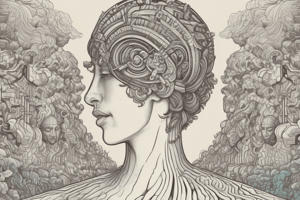Podcast
Questions and Answers
What is a key aspect of power as described in the content?
What is a key aspect of power as described in the content?
- The ability to change perceptions and influence public opinion (correct)
- The possession of wealth and resources
- The capability to impose physical punishment
- The ability to enforce laws strictly
Which of the following best describes the concept of power through dominance?
Which of the following best describes the concept of power through dominance?
- It emphasizes the importance of individual negotiation.
- It is based on the equal access to social resources.
- It derives authority from privileged access to education, knowledge, and wealth. (correct)
- It focuses on the influence of media in society.
What does Foucault argue about the nature of power in contemporary society?
What does Foucault argue about the nature of power in contemporary society?
- It guarantees the protection of the individual rights.
- It is solely maintained through legal systems.
- It is a form of relationship that is fluid and contested. (correct)
- It has become more aggressive and visible.
What role do dominant groups play in maintaining their position of power?
What role do dominant groups play in maintaining their position of power?
How is power through consent produced and perceived in democratic societies?
How is power through consent produced and perceived in democratic societies?
What does the concept of hegemony emphasize in relation to power?
What does the concept of hegemony emphasize in relation to power?
According to Fairclough, which are the two main ways to exercise power?
According to Fairclough, which are the two main ways to exercise power?
What does the process of delegitimation involve in the context of power structures?
What does the process of delegitimation involve in the context of power structures?
Flashcards
Power
Power
The ability to influence or affect change, either by imposing one's will or by maintaining the status quo.
Power through coercion
Power through coercion
Using force or threats to control others.
Power through consent
Power through consent
Gaining acceptance and legitimacy for one's actions; often achieved through language and communication.
Manufacture of Consent
Manufacture of Consent
Signup and view all the flashcards
Hegemony
Hegemony
Signup and view all the flashcards
Legitimacy
Legitimacy
Signup and view all the flashcards
Power as a relationship
Power as a relationship
Signup and view all the flashcards
Power resources
Power resources
Signup and view all the flashcards
Study Notes
Power
- Power is the ability to make changes or maintain the status quo.
- Part of power is personal mastery of speech and controlling information flow. This shapes public opinion.
- Fairclough describes two ways to exercise power: physical coercion and manufacturing consent.
- Public media acts as a vehicle for manufacturing consent, allowing contact with large numbers of people.
Power Through Dominance
- Power is based on privileged access (education, knowledge, wealth).
- This access confers authority, status, and influence.
- Privileged individuals or groups use this to dominate and control subordinate populations.
Power Through Consent
- Power is jointly produced and can be legitimate.
- The mainstream tradition emphasizes the corrective power of institutions—judicial and penal—and legitimation.
- Legitimacy requires citizens to perceive power as legitimate through appropriate ways.
- A process of delegitimation occurs simultaneously as one group legitimizes itself.
- The persuasive influence and concept of hegemony (Gramsci 1971) is where subordinate groups accept the moral, political, and cultural values of dominant groups. This process establishes an implied consensus.
Maintaining Dominance
- Dominant groups actively work to maintain dominance through political alliances.
- The more legitimate a group appears, the less coercion is needed.
Foucault's Perspective
- Society is a "barbarian state" as the true nature of power is hidden from view.
- Power is about relationships, constantly negotiated and contested.
- Unlike the traditional view, power is fluid and not fixed, constantly in flux.
Studying That Suits You
Use AI to generate personalized quizzes and flashcards to suit your learning preferences.




